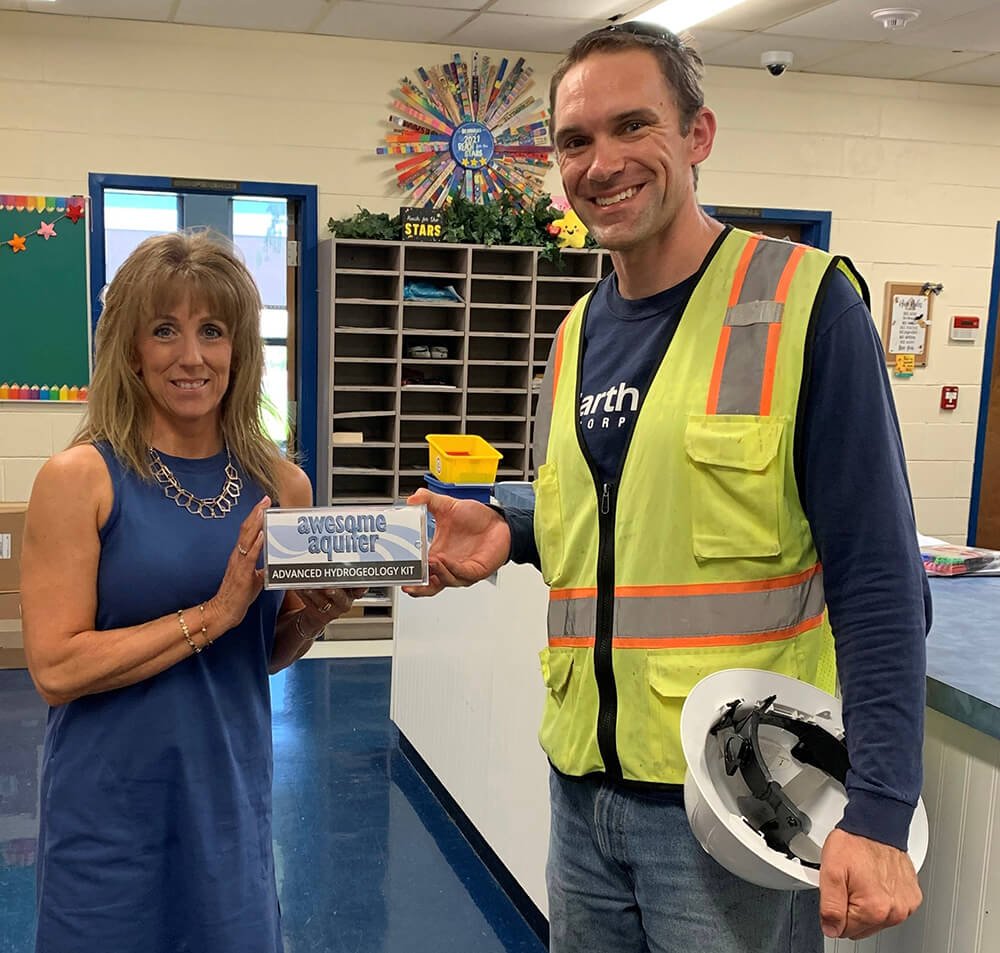Earth Data Sponsors Awesome Aquifer Kits for B.C. Charles Elementary School in Newport News, Virginia
Helping youth understand where our water comes from is important as they become stewards of our land and water sources. Earth Data, Inc., which is located in Centreville, Maryland and Newport News, Virginia, oversees the Sustainable Water Initiative for Tomorrow (SWIFT) recharge and monitoring well services project with the Hampton Roads Sanitation District (HSRD). As part of bringing awareness to the project, the company donated an Awesome Aquifer Kit to BC Charles Elementary School in Newport News, Virginia to help students learn more about our aquifers and the role they play in our water supply.
Earth Data’s SWIFT Project Manager, Brian Wachter, presents an Awesome Aquifer Kit to one of the school’s administrators at BC Charles Elementary School in Newport News, Virginia. The school is across the street from the park where Earth Data is putting in some of its wells as part of Earth Data’s Sustainable Water Initiative for Tomorrow (SWIFT) recharge and monitoring well services project with the Hampton Roads Sanitation District (HSRD). The kit can help students and adults learn all about groundwater and the role they can play in protecting this resource.
“The Awesome Aquifer Kit is a fun and educational groundwater kit with everything you need to build an aquifer model. The kit is great for use in classrooms, at community events, at festivals or fairs, or any other educational setting for students and adults to learn all about groundwater,” states Earth Data president Mark Williams.
The Awesome Aquifer kit is a National Science Standards (NGSS) aligned model that helps students visualize how groundwater is stored in aquifers, the connection between surface water and groundwater, wells and how they work, porosity, and permeability, as well as pollution and remediation of groundwater.
According to Earth Data’s SWIFT Project Manager, Brian Wachter, the company selected BC Charles Elementary School because it is across the street from the park where Earth Data is putting in some of its wells in Newport News.
“The thought is to hopefully get the kids a little more involved with the project we are doing with the aquifer there so that they could kind of see what we're doing and why it matters. I think it will help the students to better visualize some of these hydrogeological concepts instead of just looking at a picture in a book. And then if they can see it and do experiments with it, that will help them to get a better sense of what these things might actually look like,” comments Wachter.
“I think a lot of times people probably don't necessarily think about where their water comes from. But if you can see this and see what a well looks like and conceptually what the surface water bodies look like, then it will give you a better sense of what we have to do to get our water and maybe start people thinking about making sure we preserve those sources.”
The SWIFT project includes planning services, design services, contract administration, geophysical logging services, and field engineering and testing services for approximately 65 recharge wells and 30 monitoring wells. The Southeastern Virginia-based project is expected to last up to 12 years and will ultimately recharge the Potomac Aquifer with up to 100 million gallons per day of SWIFT Water®—wastewater treated to meet drinking water standards and be compatible with the characteristics of the aquifer.

